#historiography
Text
What with Federation culture being so bent for historical recreation and holodeck malfunctions spawning sapient holograms left and right, I have to imagine at least one of those inadvertently sapient holograms themselves went on to become a historian. Imagine one of those inadvertently sapient holograms studying their own namesake and coming to the conclusion that the present academic consensus – upon which they themselves are based – is incorrect. Imagine hologram Genghis Khan rocking up to the podium at the historical society symposium like "you fuckers got my personality all wrong and I'm going to make it everybody's problem".
4K notes
·
View notes
Text
Things I look for in history books:
🟩 Green flags - probably solid 🟩
Has the book been published recently? Old books can still be useful, but it's good to have more current scholarship when you can.
The author is either a historian (usually a professor somewhere), or in a closely related field. Or if not, they clearly state that they are not a historian, and encourage you to check out more scholarly sources as well.
The author cites their sources often. Not just in the bibliography, I mean footnotes/endnotes at least a few times per page, so you can tell where specific ideas came from. (Introductions and conclusions don't need so many citations.)
They include both ancient and recent sources.
They talk about archaeology, coins and other physical items, not just book sources.
They talk about the gaps in our knowledge, and where historians disagree.
They talk about how historians' views have evolved over time. Including biases like sexism, Eurocentrism, biased source materials, and how each generation's current events influenced their views of history.
The author clearly distinguishes between what's in the historical record, versus what the author thinks or speculates. You should be able to tell what's evidence, and what's just their opinion.
(I personally like authors who are opinionated, and self-aware enough to acknowledge when they're being biased, more than those who try to be perfectly objective. The book is usually more fun that way. But that's just my personal taste.)
Extra special green flag if the author talks about scholars who disagree with their perspective and shows the reader where they can read those other viewpoints.
There's a "further reading" section where they recommend books and articles to learn more.
🟨 Yellow flags - be cautious, and check the book against more reliable ones 🟨
No citations or references, or references only listed at the end of a chapter or book.
The author is not a historian, classicist or in a related field, and does not make this clear in the text.
When you look up the book, you don't find any other historians recommending or citing it, and it's not because the book is very new.
Ancient sources like Suetonius are taken at face value, without considering those sources' bias or historical context.
You spot errors the author or editor really should've caught.
🟥 Red flags - beware of propaganda or bullshit 🟥
The author has a politically charged career (e.g. controversial radio host, politician or activist) and historical figures in the book seem to fit the same political paradigm the author uses for current events.
Most historians think the book is crap.
Historical figures portrayed as entirely heroic or villainous.
Historical peoples are portrayed as generally stupid, dirty, or uncaring.
The author romanticizes history or argues there has been a "cultural decline" since then. Author may seem weirdly angry or bitter about modern culture considering that this is supposed to be a history book.
The author treats "moral decline" or "degeneracy" as actual cultural forces that shape history. These and the previous point are often reactionary dogwhistles.
The author attributes complex problems to a single bad group of people. This, too, is often a cover for conspiracy theories, xenophobia, antisemitism, or other reactionary thinking. It can happen with both left-wing and right-wing authors. Real history is the product of many interacting forces, even random chance.
The author attempts to justify awful things like genocide, imperialism, slavery, or rape. Explaining why they happened is fine, but trying to present them as good or "not that bad" is a problem.
Stereotypes for an entire nation or culture's personality and values. While some generalizations may be unavoidable when you have limited space to explain something, groups of people should not be treated as monoliths.
The author seems to project modern politics onto much earlier eras. Sometimes, mentioning a few similarities can help illustrate a point, but the author should also point out the limits of those parallels. Assigning historical figures to modern political ideologies is usually misleading, and at worst, it can be outright propaganda.
Extraordinary claims require extraordinary evidence. "Big theory" books like Guns, Germs and Steel often resort to cherry-picking and making errors because it's incredibly hard for one author to understand all the relevant evidence. Others, like 1421, may attempt to overturn the historical consensus but end up misusing some very sparse or ambiguous data. Look up historians' reviews to see if there's anything in books like this, or if they've been discredited.
There are severe factual errors like Roman emperors being placed out of order, Cleopatra building the pyramids, or an army winning a battle it actually lost.
When in doubt, my favorite trick is to try to read two books on the same subject, by two authors with different views. By comparing where they agree and disagree, you can more easily overcome their biases, and get a fuller picture.
(Disclaimer - I'm not a historian or literary analyst; these are just my personal rules of thumb. But I figured they might be handy for others trying to evaluate books. Feel free to add points you think I missed or got wrong.)
758 notes
·
View notes
Text
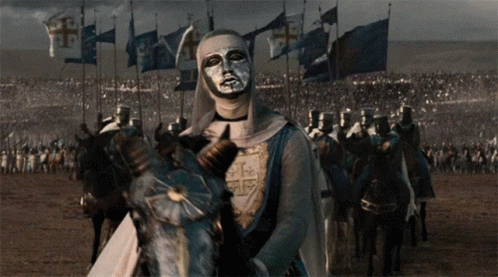
"Young Baldwin seems to have possessed a naturally strong constitution, and he was also gifted with undeniable qualities of character and a strong, lively intelligence. William of Tyre, who was his tutor, says that 'in his childhood he was very handsome, with a quick and open mind, and he rode very well, better than his forebears had done.' 'Never forgetting an injury, and still less a kindness,' he had 'a retentive memory, was well educated with an excellent memory for tales and a fondness for telling them.'
The child must have realized very early that his disease was incurable, and his reaction shows great strength of character. He wanted to forget and make everyone else forget, right up to the end, that he was sick. But by the time King Amalric died, young Baldwin's disease had made such progress that it was already beginning to show, and 'the people of the kingdom felt great grief when they looked at him.'
From 1175 onward, the regent and the barons of Jerusalem were able to count on an unexpected ally, and a more valuable one than might have at first been thought. At fourteen years the young King Baldwin emerged as an intrepid fighter, capable of leading his troops into battle and later on of commanding them personally in the field. He was seen at the side of the constable and the Count of Tripoli, riding at the head of his troops and taking part in raids and diversionary campaigns [...]. At the time the King was still too young to actually command his army, and his principal function was as a symbol and an inspiration for his men. They were all happier marching under command of their lawful King. Young though he was, he was like the flag, to be protected and followed through the thickest of the fight, and he was not afraid of personal danger. [...]
When he came to the throne, he had [...] been a leper for ten years, and although the disease did not begin to make rapid strides until puberty, it must, even in early adolescence, have weakened and exhausted him. It is unlikely that anyone would have dared to reproach him had he wished to consider himself an invalid, yet he behaved as though he were perfectly well.
He had been educated, as became a prince, by knights and masters of arms and also by churchmen [...], and these had not failed to teach him patience and prepare him for the harsh trial that was to be his life, and to arouse in him a sense of duty and pride in being, despite his infirmity, King of Jerusalem and Defender of the Holy Sepulcher. Whether as a result of education or temperament, Baldwin IV seems to have had little inclination to self-pity. The young King overcame his illness with all the determination of an adolescent who knows he is physically weak and is bent on proving to everyone, himself included, that he can equal and even surpass others. He may have been a king who had the misfortune to be a leper, but he was also a leper lucky enough to be a king.
He loved power because it was all life had to offer him, and he very early evinced a wish to govern by himself, and would not tolerate disobedience. A temperament of this kind can easily degenerate into tyranny and capriciousness in one so young, but Baldwin IV had a lively and precociously mature mind, and was sincerely concerned to do his best for the good of the kingdom; and this right up to the time when his sufferings began to drive him out of his mind. [...] Up to the last moment he wanted to be a king and a general, and he wanted to be obeyed. It was his way of clinging to life, and he was a terrible fighter."
- Zoé Oldenbourg, The Crusades (1966)
#i have been reading old books again and oldenbourg's unabashed baldwin fangirling is too delicious not to share#like girl you're supposed to be writing a history book not fanfiction#baldwin iv#historiography#kingdom of heaven 2005#crusades#zoe oldenbourg
150 notes
·
View notes
Text

#saw this elsewhere with a Bad History take appended#so I’m just posting this here#am tempted to blaze it#history#history meme#medieval history#middle ages#tagamemnon#historiography#communism#anarchist
3K notes
·
View notes
Text
Some thoughts on learning the Holocaust.
There is no scale of suffering, or trauma, or hell. Someone who survived Treblinka and someone who survived Bergen Belsen both went through hell, just different versions of it. Holocaust survivors all experienced variations of hell, from Denmark to Minsk.
But when LEARNING about the Holocaust, it’s extremely normal to learn about it at levels, starting with the least horrifying; which is why, I think, Anne Frank’s narrative has become such a universalized understanding of the Holocaust.
But then you move to transit camps, to internment camps, the ghettos, to Auschwitz, to the Operation Reinhard Death Camps (Belzec, Sobibor, and Treblinka), to the Einsatzgruppen and Babi Yar Level Shit. And every new level makes the old one look less horrifying by comparison.
In that pattern of learning, it’s perfectly rational to say things like OH PLEASE BELSEN WAS NOTHING because you are a student absorbing traumatic history in the healthiest possible way. Saying something like that, as a student of history, is not a judgement on the experiences of survivors; it’s a commentary on sequential learning.
Historiographically speaking, Holocaust survivors and Holocaust historians often mutually fail to understand each other; to the point where survivors actively dislike historians (although soon this sentence will be entirely in past tense, unfortunately). And I’m pretty sure that, for historians of things that happened within living memory, this is an ongoing concern—language of experience and survival vs. language of learning and understanding. I’m not sure where I’m going with this, but I wish we had better language for this chasm.
115 notes
·
View notes
Text
A BEATLE DIDN’T SAY THAT! Lewisohn’s lab-created quotes
“One of the things about this book that is a strength is it’s not me saying anything, it’s them or other people. I shape the text, I plot where it goes, I weave it, but the quotes are theirs. And so when I’ve got Paul McCartney behaving in a way some readers might think, ‘Whatever, oh dear,’ it’s actually him saying it. So you end up thinking that to his own credit he said that. It’s not me saying it.” (Mark Lewisohn, ‘Noted,’ (October 7, 2013) Somerset, Guy.)
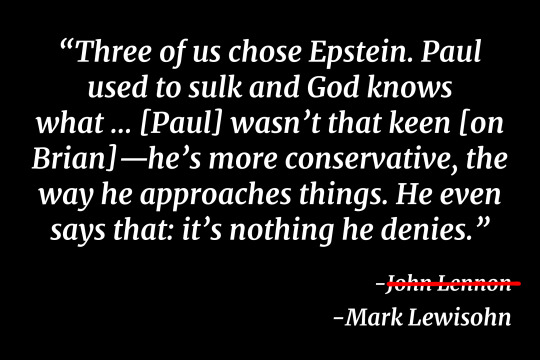
This is hella long, and that's because it's actually a full blog post. (In case you want it in a less monstrous form.)
A lot of people for a long time have put a lot of trust in Mark Lewisohn’s footnotes. Or at least in the fact of those footnotes. Because once you dig through them for any length of time you quickly discover that Mark Lewisohn’s footnotes hold secrets that would get him expelled from any undergraduate program. They reveal a “history” often contrived through a mass of Frankenquotes, ala carte creations, Lewisohn rephrased ‘paraphrases,’ and worse. For some parts of the narrative things aren’t too bad, yet in others monsters lurk around every corner. But this is not the sort of thing that’s graded on a curve, and it is past time to have a conversation about what standards should be accepted in Beatles’ scholarship.
Lewisohn lists his sources unlike most others. And his footnotes alone are more insightful than some other writers’ books. (Reddit, r/beatles)
I do not judge footnotes based on their insightfulness, nor do I want to single out a redditor, but I grabbed the comment because it’s an opinion that is widely shared and even accepted as canon. At least by people who have not combed those freakish footnotes. And while the pages of piled up sources do look fearsome en masse, a closer inspection reveals an offense to the truth, a threat to the record, and a blight on Beatles’ historiography.
“The rules for writing history are obvious. Who does not perceive that its chief law is never to dare say anything false, and never dare withhold anything true? The slightest suspicion of hatred or favor must be avoided. That such should be the foundations is known to all; the materials with which the building will be raised consist of facts and words.” –Cicero
A Look at Lewisohn’s Lab-created Frankenquotes
FIRST, WHAT ARE QUOTES? AND WHY ARE QUOTES?
Quotes are the soul and center of recorded—and recording— history.
And the rules around quotes and quotation marks are pretty simple. Most people, even if they’ve never written anything beyond a term paper, understand what quotation marks represent.
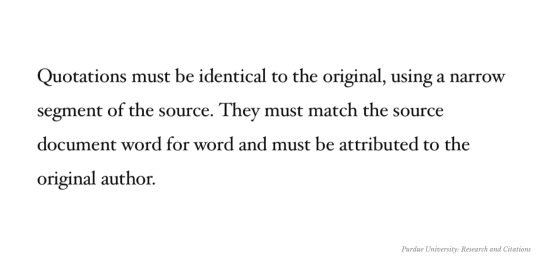
A set of quotation marks means, “This person said or wrote ‘these exact words’ at some given time.” You can smash a quote from two hours before or two years before right up against a separate quote to make your point—although it might get your grade lowered—but what you cannot do is take two different statements from two different times and make them seem like they are one statement.
When you put words inside one set of quotation marks you are stating, in black and white, that the identified person made this statement. That they said all those words together—or if you want to excise a reasonable part and use ellipses to represent that— as part of the same statement.
Look, combining two separate quotes that are not part of the same thought or topic is not a subjective issue. It is not an issue of controversy. Quotes are the bone marrow of written history. Quotes are the alpha and omega. In academic work or journalism they have to be, which makes sense as soon as you think about it. If it was cool for me to take a transcript and grab half a sentence from page 2 and half a sentence from page 17, push them together as if those words were spoken one after the other in a single thought, I bet I can manage to get those words to say almost anything I want.
Separate thoughts must be in two separate quotation marks. Separate. Somewhere between four sentences and a paragraph is widely accepted as the “two separate quotes” line, and there can be some ethical and technical wiggle room in a long rant by a person, but what makes all that subjective nonsense go out the window is if the quotes come from two separate questions. Or two separate days. That’s two quotes. Not hard.

Which again, makes sense if the point is conveying information to the reader and lessening the chance of a writer manipulating someone else’s words to express something that the person didn’t mean.
This is the contract inherent in a quote. These are the rules we all agree to and understand, and these are the reasons why. And there’s no reason to break them.
Why do you want me to believe that John said these two things at one time? What was wrong with what he did say?
THE FOUR MOST COMMON WAYS MARK LEWISOHN MAULS THE MEANING OF THE QUOTE:
The Basic Lewisohn Frankenquote 🧟♂️
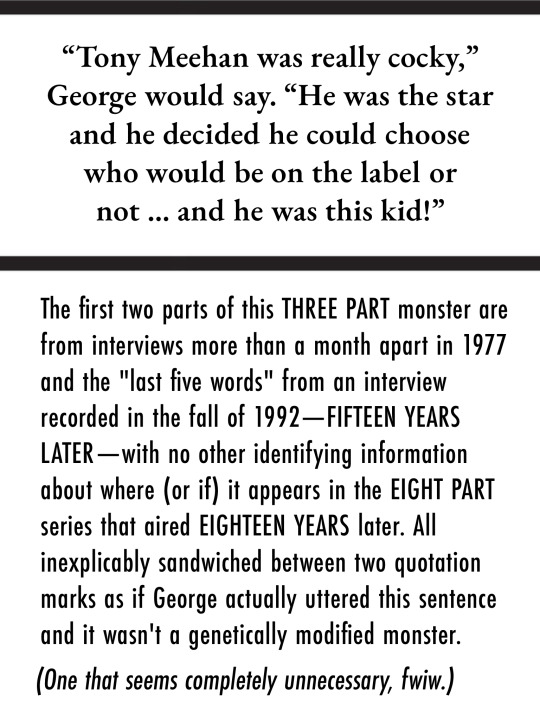
(“CONCLUDING FIVE WORDS FROM—” – I cannot even see the point of this THREE PART monster. Full footnote reads: 9) Author interview with Tony Meehan, September 6, 1995. (“I met George again in 1968 and for some reason he was harboring a grudge against me. He was very, very uptight about it—’You blocked us getting a recording contract …’ ”) First part of George quote from interview by Terry David Mulligan, The Great Canadian Gold Rush, CBC radio, May 30 and June 6, 1977; concluding five words from interview for The Beatles Anthology)
This three-headed monster attributed to George Harrison is a very dull little guy. Not particularly venomous. Just convenient, I guess. For whatever reason, Mark Lewisohn decided it was worth rummaging through the quote buffet until he collected enough pieces for George Harrison to say this thing. “…concluding five words from…” What are we even doing here? No, really. Please tell me.
And like a lot of the footnotes for these bespoke quotations, there are further problems. “[F]rom interview for Beatles Anthology”? An interview that aired? In one of the episodes? Can you narrow it down? I guess I’ll just have to listen very closely to them all and hope I don’t miss the five words.
But if we got bogged down in the sorts of trivial details that would immediately lose a college student a letter grade off a History 101 paper we would never get anywhere. We have to stick to the violent felonies.
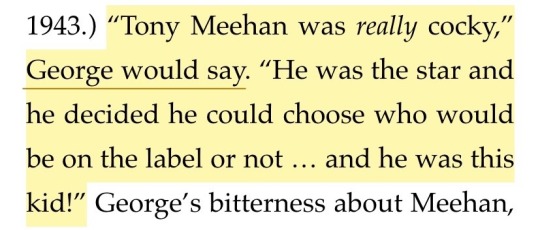
*Love the "George would say——" Uh, would he? Well, I guess after all that trouble you went to, he would now. It's really incredible how cavalier Lewisohn is about a Beatle's words.
These sorts of reconstituted, lab-engineered, made up “quotes” are shot throughout Tune In. “Quotes” made up of words from two, three, and even four sources, spoken months or often years apart.
Ala Carte Creations 🍱
It really is a buffet, and these ala carte creations come in all shapes and sizes. They might just be words that have been plucked up and glued back together to make something more useful to a particular narrative. (Ellipses or dash optional.)
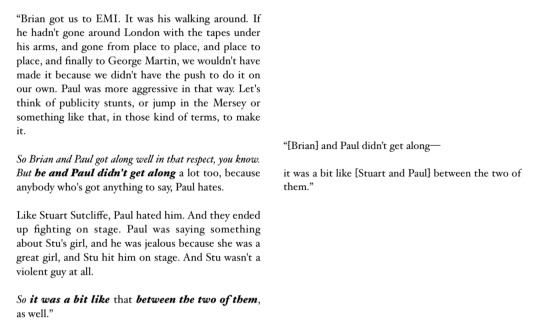
TUNE IN: “John saw a bigger picture, and it would be surprising if it wasn’t equally obvious, or made obvious, to Brian and George. He likened Paul’s enduring snag with Brian to his other long-standing difficulty: ‘[Brian] and Paul didn’t get along—it was a bit like [Stuart and Paul] between the two of them.’” (Footnote 37: Interview by Peter McCabe and Robert D. Schonfeld, September 1971)
Bonus 🍒 Phoebe's dramatic reading of John's original quote:
The Donut 🍩
Then there are a seemingly uncountable number of “quotes” with a sentence or three ripped out from the middle, but with zero representation that more words were ever there. (And in most of these particular deceptions, the simple representation of something excised (. . .) would make the quote fine. There are a lot of these, but they are also the easiest to fix.)

Chapter 10: “I was in a sort of blind rage for two years. [I was e]ither drunk or fighting. **It had been the same with other girlfriends I’d had.** There was something the matter with me.”
And then there are the true buffet bonanzas, words lifted and twisted beyond recognition until they say something brand spanking new.
However, John remembered Paul’s attitude to Brian being very different. John was always emphatic that Paul didn’t want Brian as the Beatles’ manager and presented obstacles to destabilize him, to make his job difficult … like turning up late for meetings. “Three of us chose Epstein. Paul used to sulk and God knows what … [Paul] wasn’t that keen [on Brian]—he’s more conservative, the way he approaches things. He even says that: it’s nothing he denies.”
The Lewisohn Remixes 🍸
And then there are the “paraphrases.” I couldn’t even begin to guess how many of these there are, and often they aren’t even paraphrases, but whole new Mark Lewisohn re-interpretations with quotation marks slapped around them. But if you don’t check, you probably won’t know, because like this Lewisohn rewrite of a well-known Mrs. Harrison quote, there’s a good chance you’ll recognize the bulk of it, making it less likely that you’ll catch the scalpel work excising Paul. And while I don’t want to get caught in the nooks and crannies of intent in an example like this one I have to say, just this once, that what has to be a purposeful excising of Paul to create a slightly new quote on one side, combined with a badly acted, bad faith—(or bad scholar)—“Where was Paul when John’s mom died?” on the other, is par for the course.
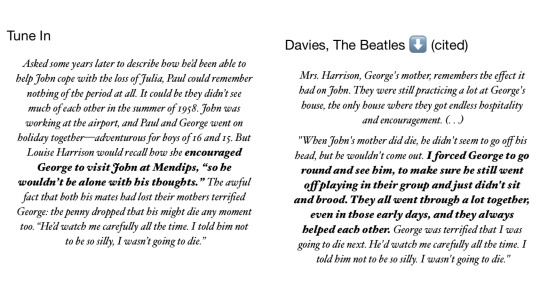
George Harrison’s mom’s made up Lewisohn rephrase which coincidentally removes Paul from the imagery.] ❦ LEWISOHN:“ Asked some years later to describe how he’d been able to help John cope with the loss of Julia, Paul could remember nothing of the period at all. It could be they didn’t see much of each other in the summer of 1958. John was working at the airport, and Paul and George went on holiday together—adventurous for boys of 16 and 15. But Louise Harrison would recall how she encouraged George to visit John at Mendips, “so he wouldn’t be alone with his thoughts.” ❦ DAVIES: “They were still practicing a lot at George’s house, the only house where they got endless hospitality and encouragement. . . . I forced George to go round and see him, to make sure he still went off playing in their group and just didn’t sit and brood. They all went through a lot together, even in those early days, and they always helped each other.”
Why do you have to slice and dice and reconstitute people’s words? No writer, and certainly no historian, should ever feel empowered to take words from a historical figure from two or three different places and topics and times, splice them together, and tell us, “Winston Churchill said this.” No he didn’t! Why are you so intent on changing the words of the people you’re writing about? What’s wrong with just using two different quotes?
You cannot take two or three quotes from two or three or even four separate statements, stick them between one set of quotation marks and say John or Paul or George or Joe Smith said this.
No they didn’t. They never said that. Why do you want me to think they did??
All these words are Abraham Lincoln’s, but this is not a Lincoln quote:
“Every man is said to have his peculiar ambition. Whether it be true or not, I can say for one that I have no other so great as that of — making a most discreditable exhibition of myself.”
(I kept it ridiculous, although I didn’t have to.)
But I want you, the reader, to be saying to yourself, “Okay, enough already. I get it!” Because in the last few days I have wandered too far into the weeds too many times and written far too many words detailing the multiplicity of ways Mr. Lewisohn does violence to each and every law of reporting historical facts, and could write many more. And I will post a more detailed list of the crimes against the quote that I am charging Mark Lewisohn with as we go forward, but I don’t think we need that now. The fact is that every fair-minded person knows what quotation marks represent, and there is no more fair-minded group of people than serious Beatles fans and scholars. And it is those fair-minded scholars who I want most to hear me. Whether you’ve written books or host a podcast or just know that you know a whole lot of stuff and take seriously your part of the trust in preserving the truth about The Beatles for us and future generations, it is you I am really talking to. My Cicero quoting-freaks. The ones who care about getting it right.
“The chief, the only, aim of style is to put facts in a clear light, with no concealment.”
- Lucian of Samosata
What footnotes can do, and what footnotes can’t.
You can list multiple sources in a single footnote. That’s not only fine, it’s correct. If I want to tell part of a story based on several sources, that often means several sources in a footnote. But not for one, single quote.
The problem isn’t the footnote, it’s the bioengineered quote on the page that you swept under a footnote hoping I wouldn’t notice.
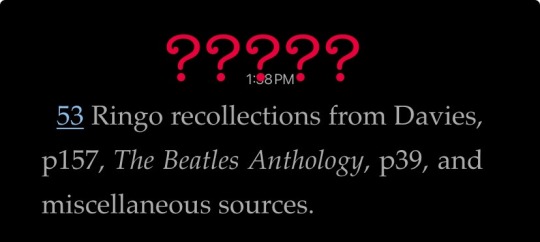
Which leads us to what a footnote is not. A footnote is not a post-hoc fixative for your textual sins. You cannot do whatever you want as long as you confess it in a footnote. A footnote is not a magic spell. A footnote is not the universally understood symbol for “I have my fingers crossed behind my back.” You cannot fix lies and misrepresentations in the footnotes. Footnotes aren’t for trying to chase down three different sources to match up which part of a manufactured “quote” someone said on which date. Footnotes are not the picture on the front of a puzzle box. I should not need to find corner pieces to figure out which of these George Harrison words were actually spoken together.
Footnotes are a truthful and independently verifiable record of primary sources. It’s that simple.
And taking Mark Lewisohn completely out of the picture for a moment, I feel sure we can all agree that neither John Lennon nor Paul McCartney nor George Harrison nor Ritchie Starkey would want anyone rearranging their words as if they were guitar chords. You wouldn’t take three-quarters of Penny Lane and one-quarter of Across the Universe, put them together and call it a Beatles‘ song. So don’t take three quarters of John to Jann Wenner and one-quarter of John to Lisa Robinson, put them together and call it a Beatle’s quote.
MY PERSONAL STANDARD IS THAT IF SOMEONE REPRESENTS, “A BEATLE SAID THIS,” IT BETTER DAMN WELL BE SOMETHING A BEATLE SAID.
None of the Beatles, dead or alive, would be cool with their words being taken out of context at all, let alone two or three different statements on god knows what being combined into one. This isn’t hard, though. Use two or three separate quotation marks, and don’t take statements out of context. Don’t mix and match their words, but don’t twist them, either. If a person said something, it is the historian’s duty to represent those words to the best of your ability, and then use them to tell a factual story focused on what you feel is important. Staying true to the original words and true to their meaning. If you can’t use those words without twisting them, then change your story to fit their words, not the other way around. If their statement helps tell the story your way, use it! For goodness sake, John Lennon said at least two opposing things about almost every topic on earth, so there should be enough to choose from without being deceptive. I actually want the truth. Don’t you?
Biography is story based around accurately represented, trustworthy and verifiable facts. And look, Beatles fans, whoever your favorite is: we are not going to get the truth about his history if we don’t learn to take these things seriously. Let’s have—if not high standards—at least the lowest generally accepted standards. In the mid-term we need a lot more Beatles scholars with a lot more points of view, and now—right now—we need experienced Beatles scholars to prioritize searching out and finding smart, interested people to mentor. And we simply must ensure that we aren’t allowing to solidify into stone “facts” that are not facts and statements no one ever made. I don’t think any honest Beatles fan—(which rounds up to all of them)—wants any question around that issue.
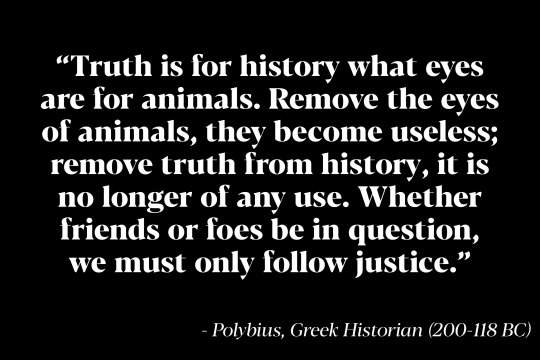
The record is the most important thing. Now, and always. This is not about John versus Paul. John versus Paul may live on always in our hearts, but for Beatles history, it’s the wrong question. I’d rather someone be up front about their loves, but in the end the focus should be on representing the primary facts in their most pristine form. Love who you love most, but place truth above all. Pristine facts. Pristine quotes. Nothing hidden. Nothing misrepresented.
Let the historical actors speak for themselves. That is their right.
And the historian’s duty.
NEXT, WE DISSECT A MONSTER.

Final note: I became frustrated and (maybe strangely) offended by Lewisohn's obscene pretenses in 2020, but my frustrations were nebulous and unfocused until this incredible AKOM series. I feel much better now. Angrier. But better. They worked their asses off. 🥂
#lewisohn#akom#the beatles#tune in#fine tuning#frankenquotes#lewisohn's monsters#historiography#paul mccartney#john lennon#george harrison#ringo starr#mark lewisohn#a beatle never said that#beatles#brian epstein#allen klein#Spotify
161 notes
·
View notes
Text
Studying historical porn is difficult, because no one archives their goddamn porn. Porn is dismissed as embarrassing, obscene, and of no historical relevance, leaving the hopeful porn historian with an absolutely bizarre sample. People are even less likely to archive pornographers’ diaries, letters, and business records, which would give us a sense of how the industry worked. Our most reliable source is legal cases, which excludes many people (such as anyone who was good at not getting caught).
-Ozy Brennan, Porn in Early Twentieth Century Britain
302 notes
·
View notes
Text
I've been thinking about how to articulate a thought I had about a possible Doylist/non-diegetic reading(EDIT: I originally wrote "Watsonian" here, which is the opposite of what I meant X| X| Brain, you Tricksome Jester *shakes entirely metaphorical fist*) of Eridan's Trollian handle, caligulasAquarium, in response to a post of @mmmmalo's, and I think I've got it.
Ok So: the popular perception of Caligula is as a "Mad Emperor". One of the points used in this depiction is his "War on the Sea", which is taken as obvsl absurd and empty and irrational(and possibly hubristic). Eridan chooses to call himself "caligulasAquarium" and he lives in a wrecked ship(a feature commonly put in aquariums)... on the surface.
So like: maybe the title is meant to be taken by the audience as ironic. Eridan's claim to an "Aquarium" is as absurd and empty and irrational as Caligula's claim to have warred upon the sea(in the common understanding of those events; as a matter of history this seems to be a Telephone distortion, from the sources I can find).
A few more points that have occurred to me since I started writing this:
Caligula "Made War on the Sea"; Eridan wants to "Make War on the Surface" by Killing All Landwellers, carrying forward the themes of inversion btwn Alternia and Earth.
Also: "Kill All Landwellers", "Kill All Humans": he's lampshading common evil-alien-overlord tropes
...Which in itself is sort of dunking on HIM, since Eridan is nobody's overlord he's just some GUY. Like: Yes, he's "Nobility" due to blood-caste, but he has no influence, no power, no RESPECT from anyone we meet, no friendships let alone alliances with other socially powerful individuals(other than Feferi, who seems to have foresworn all that to monastically care for G'lybgolyb) that he could USE to have influence; he's just a loner with his grand-dad's gun and allot of pretension.
...which you could argue furthers his parody of USian internet white-supremacists? Like: He is THEM: a gun-humping loner who only feels comfortable talking to the people he claims to hate, with no idea how unpleasant he makes himself to interact with, and even less interest in introspection or self-awareness, fetishizing past genocides as a way to claim for himself a "Glorious Past" he had nothing to do with.
As Feferi(and possibly other characters I'm forgetting) point out, Eridan's ambition to Kill All Landwellers is more than a little absurd. He's never really DONE anything to plan or prepare for it, and aside from Fef he exclusively hangs out with and befriends Landwellers, as well as LIVING ON LAND(well: a sandbar or reef). This could be taken as furthering the Caligula "War on the Sea" parallel.
Expanding on the last: Caligula, THE EMPEROR OF ROME and Grandest of Nepo-babies, was rather notably disdainful of and hostile towards the Roman nobility and inherited wealth/rank. This connects to Eridan in two ways I can think of: 1) his avoidance of other seadwellers, and 2) his philosophical hostility to landdwellers while Being, in practice, A Landweller. Basically: both Hate things about themselves shared by others.
Reinforcing #3: the choice of Caligula, a Troll-Emperor. Again: Eridan is Just Some Guy; he does not command armies, he does not command society, he can't even command Equius, who GETS OFF ON being ordered around. This is Pretension.
...which, I guess, you could connect AGAIN back to Caligula via the popular memory of him wanting to be treated "As A God", but it should be noted that 1)everyone who wrote anything about him hated the guy and was explicitly dunking on him, so we don't know how accurate these charges are, and 2)in the Roman context, while legal apotheosis was reserved for after death, imperial Divinity was already de facto given that sacrifices and prayers to the Emperor's health and success were legally mandated civic religious duties, AND 3)that classical Greeks and Romans, contra the Abrahimic societies which would later create this popular memory, considered apotheosis a real possibility for notable individuals.
#Homestuck#Eridan Ampora#caligulasAquarium#Irony#zA Analysis#Homestuck Analysis#History#Gaius Caesar Augustus Germanicus#Caligula#Historiography#zA Writes#Our Staff#zA's Endemic Historicality#Watsonian vs Doylist#My Traitorous Brain#zA Corrections
115 notes
·
View notes
Text

Blaming the Victims. Spurious Scholarship and the Palestinian Question, Edited by Edward W. Said and Christopher Hitchens, Verso, London and New York, NY, 1988
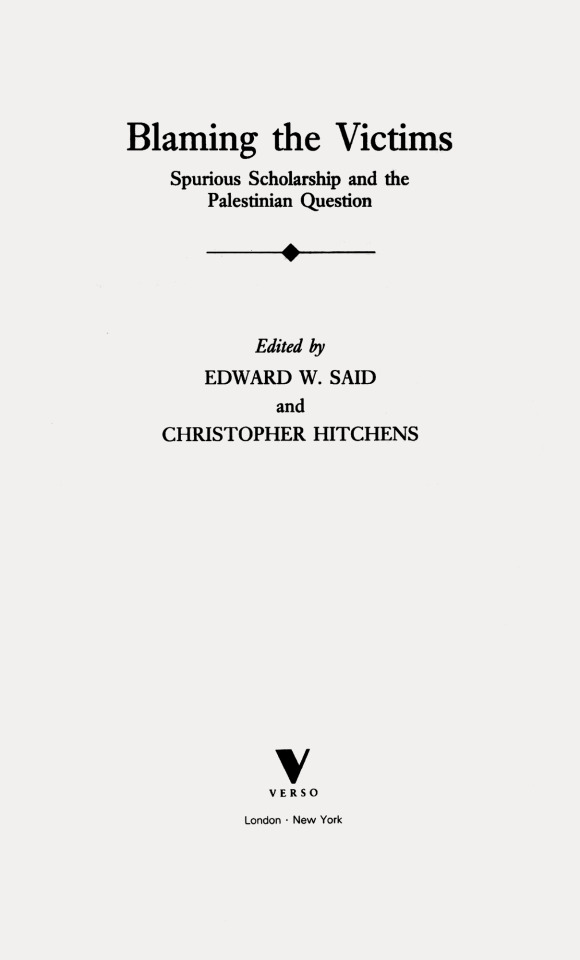
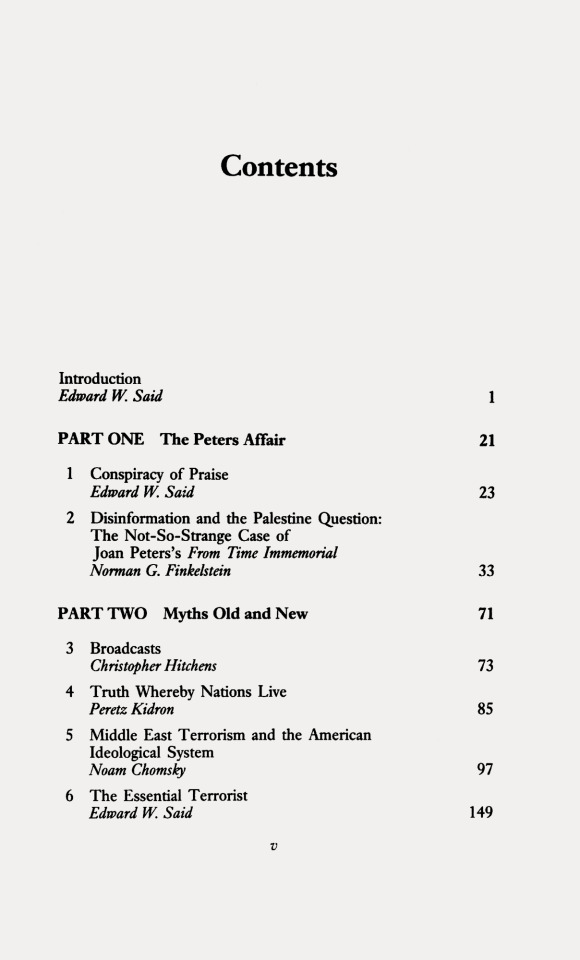

Contributors: Ibrahim Abu-Lughod, Janet L. Abu-Lughod, G.W. Bowersock, Noam Chomsky, Norman G. Finkelstein, Muhammad Hallaj, Rashid Khalidi, Peretz Kidron, and Elia Zureik
#graphic design#history#historiography#book#cover#book cover#edward w. said#edward said#christopher hitchens#ibrahim abu lughod#g. w. bowersock#noam chomsky#norman g. finkelstein#muhammad hallaj#rashid khalidi#peretz kidron#elia zureik#1980s
150 notes
·
View notes
Text
Note about periodization
I am going to start describing time periods in Chinese history with European historical terms like medieval, Renaissance, early modern, Georgian and Victorian and so on, alongside the standard dynastic terms like Song, Ming and Qing I usually use. So like something about the Ming Dynasty I will tag Ming Dynasty and Renaissance. I already do it sometimes but not consistently. Here’s why.
A common criticism levied against this practice is that periodization is geographically specific and that it’s wrong and eurocentric to refer to, say, late Ming China as Renaissance China. It is a valid criticism, but in my experience the result of not using European periodization is that people default to ‘ancient’ when describing any period in Chinese history before the 20th century, which does conjure up specific images of European antiquity that do not align temporally with the Chinese period in question. I have talked about my issue with ‘ancient China’ before but I want to elaborate. People already consciously or subconsciously consider European periodizations of history to be universal, because of the legacy of colonialism and how eurocentric modern human culture generally is. By not using European historical terms for non-European places, people will simply think those places exist outside of history altogether, or at least exist within an early, primitive stage of European history. It’s a recipe for the denial of coevalness. I think there is a certain dangerous naivete among scholars who believe that if they refrain from using European periodization for non-European places, people will switch to the periodization appropriate for those places in question and challenge eurocentric history writing; in practice I’ve never seen it happen. The general public is not literate enough about history to do these conversions in situ. I have accumulated a fairly large pool of examples just from the number of people spamming ‘ancient China’ in my askbox despite repeatedly specifying the time periods I’m interested in (not antiquity!). If I say ‘Ming China’ instead of ‘Renaissance China’ people will take it as something on the same temporal plane as classical Greece instead of Tudor England. How many people would be surprised if I say that Emperor Qianlong of the Qing was a contemporary of George Washington and Frederick the Great? I’ve seen people talk about him as if he was some tribal leader in the time of Tacitus. European periodization is something I want to embrace ‘under erasure’ so to say, using something strategically for certain advantages while acknowledging its problems. Now there is a history of how the idea of ‘ancient China’ became so entrenched in popular media and I think it goes a bit deeper than just Orientalism, but that’s topic for another post. Right now I’m only concerned with my decision to add European periodization terms.
In order to compensate for the use of eurocentric periodization, I have carried out some experiments in the reverse direction in my daily life, by using Chinese reign years to describe European history. The responses are entertaining. I live in a Georgian tenement in the UK but I like to confuse friends and family by calling it a ‘Jiaqing era flat’. A friend of mine (Chinese) lives in an 1880s flat and she burst out in laughter when I called it ‘Guangxu era’, claiming that it sounded like something from court. But why is it funny? The temporal description is correct, the 1880s were indeed in the Guangxu era. And ‘Guangxu’ shouldn’t invoke royal imagery anymore than ‘Victorian’ (though said friend does indulge in more Qing court dramas than is probably healthy). It is because Chinese (and I’m sure many other non-white peoples) have been trained to believe that our histories are particular and distant, confined to a geographical location, and that they somehow cannot be mapped onto European history, which unfolded parallel to the history of the rest of the world, until we had been colonized. We have been taught that European history is history, but our history is ethnography.
It should also be noted that periodization for European history is not something essentialist and intrinsic either, period terms are created by historians and arbitrarily imposed onto the past to begin with. I was reading a book about medievalism studies and it talked about how the entire concept of the Middle Ages was manufactured in the Renaissance to create a temporal other for Europeans at the time to project undesired traits onto, to distance themselves from a supposedly ‘dark’ past. People living in the European Middle Ages likely did not think of themselves as living in a ‘middle’ age between something and something, so there is absolutely no natural basis for calling the period roughly between the 6th and 16th centuries ‘medieval’. Despite questionable origins, periodization of European history has become more or less standard in history writing throughout the 19th and 20th centuries, whereas around the same time colonial anthropological narratives framed non-European and non-white societies, including China, as existing outside of history altogether. Periodization of European history was geographically specific partially because it was conceived with Europe in mind and Europe only, since any other place may as well be in some primordial time.
Perhaps in the future there will develop global periodizations that consider how interconnected human history is. There probably are already attempts but they’re just not prominent enough to reach me yet. Until that point, I feel absolutely no moral baggage in describing, say, the Song Dynasty as ‘medieval’ because people in 12th century Europe did not think of themselves as ‘medieval’ either. I am the historian, I do whatever I want, basically.
#I was watching an unrelated video about dnd worldbuilding#and out of nowhere someone in the comment section called 1300s chinese people 'ancient asians'#*facepalm*#so I was reminded of this again#rant#colonialism#orientalism#chinese history#historiography
927 notes
·
View notes
Text
"Those who do not learn history are doomed to repeat it," and those who don't question history's methods, standards, and values are doomed to never learn it. Here are five free historiography essays.
Venus in Two Acts: A scholar of African American history grapples with the problem of writing about a slave when "no one recorded the things she said, or observed that she refused to say anything at all".
Introduction to Agnotology: A historian and philosopher who has spent his life fighting corporate disinformation campaigns writes “about the conscious, unconscious, and structural production of ignorance”.
Introduction to Landmark Thucydides: A contemporary historian evaluates the research methods, and reliability, of a “historian” born around 460 BC. The full introduction is available in the Amazon preview.
Can the Mosquito Speak?: What happens when history focuses on nonhuman forces? How have animals shaped human society?
The Idea of Provincializing Europe: A postcolonial historian confronts his own intellectual “inheritance” of Enlightenment thought: the methods and standards of the colonizers.
63 notes
·
View notes
Text
Common Misconceptions About the End of the Roman Republic
Julius Caesar was not born by Caesarean section. Romans only performed that procedure on dead mothers, and Caesar's mother definitely lived another 40+ years.
Julius Caesar was almost certainly not Marcus Brutus' father. He was only 15 years older than Brutus, and Servilia was married to someone else.
Caesar's electoral campaign for 59 BCE was funded by his intended co-consul, Lucius Lucceius, not by Crassus. Although Crassus probably loaned Caesar money at other times.
It is not clear whether Caesar and Pompey used armed intimidation to get their legislation passed in 59 BCE, as neither of them had an army at this time, no contemporary source charges Caesar with political violence during his consulship, and only some of their proposed bills actually passed. See Robert Morstein-Marx's Julius Caesar and the Roman People for more.
Caesar was not an ideologue or demagogue, nor was his legislation particularly radical or populist. He was neither a "voice of the working man" nor a fascist. However, the methods he used to get what he wanted, and his refusal to back down at critical moments, were controversial and sometimes illegal.
Caesar was probably not behind the Vettius affair, considering that Vettius had previously attempted to get Caesar killed.
Caesar was also almost certainly not a member of the Catilinarian conspiracy; in fact, he assisted Cicero's investigation of it.
The "first triumvirate" was not an official group in the same way the second triumvirate was, nor did it overwhelmingly dominate Roman politics. Most of the triumvirs' legislation failed after the first half of 59 BCE, and most of their electoral candidates were unsuccessful.
Caesar didn't conquer all of Gaul, since the Romans already ruled the southern coast and Cisalpine Gaul.
Caesar landed on Britain, twice, but did not conquer it.
The Gauls were not "savages," but a diverse and sophisticated collection of tribes with their own agriculture, political systems, artwork, trade networks and more.
Caesar's Gallic Commentaries are mostly reliable for concrete events and dates, but less so for distances, troop numbers, and people's motivations. The Civil War Commentaries are even more biased.
There was probably no serious threat of Caesar being prosecuted if he entered Rome without imperium. His conquest of Gaul had been highly popular (with the Romans) and his laws had been repeatedly upheld by the Senate. See Morstein-Marx again.
Caesar did not go to war "against the Senate" or "against the republic." The Caesarian and Pompeian factions in the Senate were roughly equal in size, and the overwhelming majority of senators preferred peace over either one.
Caesar did not say "The die is cast" or any variant of it while crossing the Rubicon. He had already sent troops into Italy, and the Senate had begun military action against him over a month before.
The civil war of 49 BCE was caused by a mutual breakdown between Caesar, Pompey, and other factions in the Senate, not solely by one man.
Caesar and Pompey's falling-out was not caused by the death of Crassus or Caesar's daughter Julia, which happened years before any evidence of a rift appeared.
Most of the Pompeians were not fighting "for the republic," and Cicero expected a dictatorship to occur no matter which side won.
Caesar was not the first dictator of Rome, or even its first dictator for life; the first dictator for life was Lucius Cornelius Sulla in 82 BCE.
Caesar also wasn't the first Roman general to march on Rome. That's Sulla again, or possibly Coriolanus if you believe he was real.
There is no evidence that Roman armies considered themselves more loyal to their commanders than to the republic until very, very late in Caesar's civil war, when we first hear of soldiers calling themselves "Caesarians" in Spain. Caesar, Pompey, Marius, and Sulla all had to argue their political legitimacy to their troops before they could make them fight other Romans. See Erich Gruen's Last Generation of the Roman Republic for details.
Caesar was killed in the Theater of Pompey; the Senate house had been burned down years before.
Caesar's last words are unknown, although classical sources suggest "Kai su, teknon?" (You too, my son?), "Casca, what are you doing?" "Why, this is violence!" and silence as possibilities.
Caesar is not usually categorized as an emperor by modern sources, but some ancient writers like Suetonius did.
Augustus was not born in August, but in September.
Octavian never went by Octavian. First he was Gaius Octavius (Thurinus), then Gaius Julius Caesar (Octavianus), then added "Divi Filius" and "Augustus" and eventually replaced the first two words with "Imperator."
Cleopatra probably was not killed by a snakebite. She had much more reliable and less painful poisons available.
Cleopatra was not the last pharaoh of Egypt. The last native Egyptian pharaoh was Nectanebo II, the last Ptolemaic pharaoh was Caesarion (Ptolemy XV), and the last Roman emperor recognized as pharaoh was Maximinus Daza.
Augustus' reputation as a coward comes from his enemies. He fought numerous battles throughout his career, including the two he was accused of ducking, Mutina and Philippi. (He fought in the second confrontation for each one.)
Augustus didn't declare himself ruler of Rome. Although he was de facto the ruler, he was officially just "the first citizen" (princeps), a concept that long predated him.
Although initially patricians were the aristocratic class, by the late republic they made up only a minority of the aristocracy; the rest were wealthy plebeian families.
The Senate could not pass laws on its own during the late republic; its legislation had to be ratified by the People's Assembly.
The Roman government was not as democratic as most modern republics, with much less of the population represented, but it did have some popular influence on government policy, and public demonstrations and protests were common.
Roman politicians do not fit into modern political movements like socialism, fascism, or liberalism, or into stable parties like democrats or republicans. Roman politics was driven mainly by personal alliances and rivalries rather than by ideologies.
Although the "Roman empire" is sometimes used to refer to the period when Rome had emperors, Rome had an empire-like system of provinces, conquest, and tribute as early as after the First Punic War in 241 BCE. Julius Caesar and Augustus initiated a change in how Rome was governed, but they did not create Roman imperialism.
Roman women played an active role in politics, particularly in coordinating marriage alliances, communication networks, advocating on behalf of their families, public protests, and diplomatic negotiations behind the scenes.
The late republic was very ethnically and religiously diverse, with many Roman citizens descended from Greeks, Africans, Gauls, Jews, Iberians, and other groups. Mixed marriages and multilingualism were common.
Romans did not categorize sexuality by gender attraction, and most Roman men would not have identified as what we now call heterosexual. See Roman Homosexuality by Craig Williams for details.
Most famous Roman monuments, like Trajan's column and the Colosseum, date to after republican times. During Cicero's era the city was mostly brick and wood.
Historians do not agree on why, or when exactly, the republic "fell." Not all of them believe it was "doomed," either. It's likely that many connected factors, and random chance, played a part.
Suggested sources for learning more:
SPQR: A History of Ancient Rome, by Mary Beard
Cato the Younger: Life and Death at the End of the Roman Republic, by Fred Drogula
Cicero: The Life and Times of Rome’s Greatest Politician, by Anthony Everitt
Augustus: First Emperor of Rome, by Adrian Goldsworthy
Julius Caesar and the Roman People, by Robert Morstein-Marx
Historia Civilis
The History of Rome podcast by Mike Duncan
Everything on my recommendations page
#putting all these in one place for convenience. may add more as i think of them#jlrrt essays#historiography
140 notes
·
View notes
Text

#history#primary sources#historiography#it’s hard work but someone’s gotta do it#beware drivebys!#citizens my arse!
48 notes
·
View notes
Text
To whom it may concern: I've passed the history finals!! It was actually a really good experience? Like the committee was super nice??
Also managed to (very casually ofc) throw in there that today's the 230th anniversary of Danton and Camille's execution.
Not sure if that helped me or made me seem slightly unhinged. Quite possibly a bit of both, but hey, I did it for us!
#frev#personal#also made a point of roasting Suetonius because you've gotta#student life#studying#one more step towards my degree#history#exams#french revolution#frev community#historiography#ramblings
44 notes
·
View notes
Text
History memes #6

For real though, I’m curious to y’all, who was taught either the Islamic golden age or Indian golden age in school? Cause I don’t think I was taught these until the college level (though I did study the Islamic one independently, though I sadly am not as familiar with the Indian golden age… proving the point)
#history memes#funny humor#funny memes#history#renaissance#golden age of Islam#golden age of India#historiography#islam#india
68 notes
·
View notes
